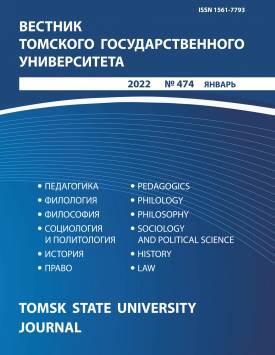Cognitive-pragmatic program “Law of Conscience” in the film construct “Boys”: The target vector
This article considers the author's version of a film construct's sociocognitive modeling based on the original theory of cognitive-pragmatic programs (CPPs). The relevance of this kind of modeling is due to both the social significance of the studied conceptual film text, and the complexity of its analysis as a synthetic text of culture. The source of the research is the film construct of the famous Soviet film Boys. To substantiate the author's methodology, the traditions of psychology and modern sociocognitive ideas are used. The goals of the leading CPPs' initial formula of the film construct (“The Law of Conscience”) envisage the implementation of three main processes: (a) transformation and adjustment of the basic cognitive-mental subsystems of consciousness of a “problem” teenager who has fallen into the zone of influence of destructive CPPs; (b) the formation in his mind of a constructive personal, social and civic identity; (c) “withdrawal” of a teenager from the zone of activity of destructive-manipulative programs with their subsequent blocking. These processes determine the general target vector for the implementation of the “Law of Conscience” CPP. In the aspect of goal-setting, the program works simultaneously in two modes: goalsetting for oneself and goal-setting for the object of socialization (adolescent). At first the goal-setting is active and meaningful only for the program itself; the adolescent is aware of the formal presence of a goal, but does not identify it as his own; therefore, the degree of activity of the consciousness of the subject-personifier remains extremely low. To solve this problem the CPP bearer must find out how the consciousness of the object of socialization has changed as a result of destructive influence through observation (over the adolescent or his parents, the source of his desocialization) and analysis of behavior. The “Law of Conscience” CPP, activating the second mode of goal-setting (for a teenager), seeks to personify the goal formed in its structure and create conditions under which the teenager begins to perceive it as his own. The “Law of Conscience” CPP is focused primarily not on the “result at any cost”, but on the activation and maintenance of the internal activity of the processes of harmonious cognitive-mental rehabilitation of the adolescent's consciousness, which is realized in the scene of the trial of V. Kireev as a result of a speech by the head of the camp, P.V. Antonov. The “Law of Conscience” program cannot make a choice for the teenager. He must start the movement, feeling support by himself. A simple rule works here: “the ‘other' believes in me - I must justify his belief in himself - I must accept his trust as my own - I must learn to believe in myself”.
Keywords
cognitive-pragmatic program, subject-source, subject-personifier, “circle of alienation”, goal-setting, aggressive-simulatory stateAuthors
| Name | Organization | |
| Ivanov Dmitry I. | Xi 'an International Studies University | ivan610@yandex.ru |
References

Cognitive-pragmatic program “Law of Conscience” in the film construct “Boys”: The target vector | Vestnik Tomskogo gosudarstvennogo universiteta – Tomsk State University Journal. 2022. № 474. DOI: 10.17223/15617793/474/15
